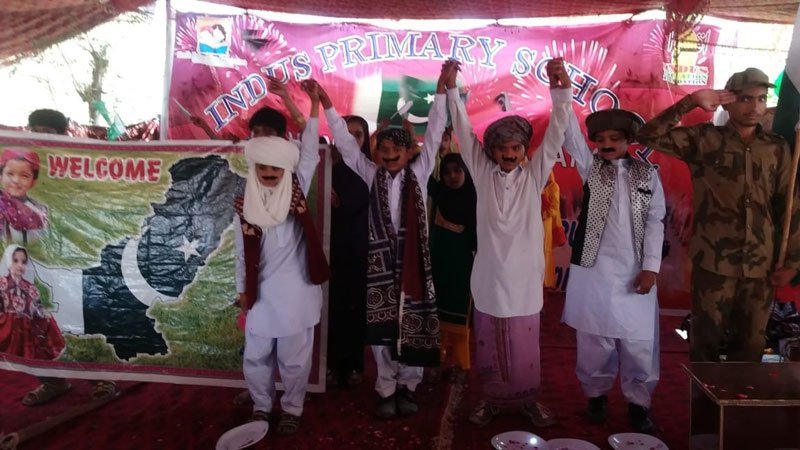Indus Education Foundation (IEF) is a registered organization to serve the cause of rural education initially in Sindh but will expand its capacity later. It has been working since last two years and has adopted some schools through Sindh Education Foundation in Taluka Hala, District Matiari and is monitoring their administrative and financial up-gradation since last two years.
The most appreciated development has been seen in the school of Punhoo Jamali, where the admission increased by 200% in the last two years. The most ambitious objective of the Indus Education Foundation is to improve literacy rate particularly in rural areas focusing primary education. In fact, the country’s rural population is more than 66% and literacy in rural areas is not more than 10%. This is why the people coming from villages to metropolitan cities lack modern technology updates. The most valuable reason of their failure in cities is lack of education. The health conditions in the environment are poor that the females usually deliver their children without any hospital assistance inside the houses. There are dispensaries but no doctor or medicines are available. The schools adopted by the IEF are gradually improving their conditions. One can observe in those schools a village boy speaking English and working on a computer. The organization made the school of Punhoo Jamali as a model, started this work about two years ago, is now preparing a comprehensive proposal to improve school environment in the villages of taluka Hala.
Back Ground:
The schools in the villages nearby Hala are suffering from negligence. The socio-economic survey conducted by Indus Education Foundation informs that out of 100 children in a village between the age of 3 and 5, only 60 children go to the school. Very unfortunately, the number of school going girls is around 25%. According to the same survey, only 5% children get admission in the middle school when they complete their primary education. This is the main tragedy with the children and this is mainly due to poverty and non-availability of vehicles. Due to that the primary education remains of no use for the children’s future.
Reasons:
It is alarming to see in rural areas of Hala Taluka that people send their children to agricultural fields instead of sending them to schools. The most visible reason of this tragedy is poverty but this reason is in connection with social awareness about education, feudalism, health, negligence by the department and non-availability of funds. In addition, people are not aware of their growing number of children. For example there are several cases that in a one-room house, about 10 family members are residing. The road from villages towards the main town of Hala is not constructed well and there is no proper vehicle available to transport them during the health emergency conditions as well.
The schools are mostly built with two rooms inside although the basic primary education contains five classes and they are running the two classes in one room and three in the other. This way the quality of education is not maintained.
Alternatives:
To enhance the awareness for quality education in rural areas of Taluka Hala, Indus Education Foundation proposes to act socially, academically and financially to make the villagers aware about their children’s future. Our main focus is divided into two major factors i-e to provide computer literacy and focusing on English language proficiency among the children along with their mother tongue. This proposal will be consequently implemented after technical assistance into following steps.
- Construction of one extra room to facilitate the children for attending classes separately at least in class IV and V.
- Provision of Pentuim-IV computers along with printers to all the selected schools.
- Providing training to all the teachers for teaching computers and more methods of training.
- Efforts to aware the parents of the children for sending their boys and girls to schools. In this regard, small workshops may be organized within the school premises, inviting the parents to participate.
- Suitable vehicle on hiring basis may run through the selected villages from Hala town to provide a pick & drop service to the teachers and to those children who are studying in middle school of Hala. This facility is suggested because the teachers living in urban environment of Hala Taluka are vulnerable to be posted in villages and most of the children passing their primary usually can’t afford a vehicle to attend their middle school.
- Establishment of an office to supervise all these works in Hala town.
Conclusion:
In beginning, we have conducted the complete socio economic survey of the two union councils of Hala Taluka, showing the actual number of children going to school and the children left back at houses. But it would be very difficult to carry all the villages at one time; hence we propose to operate this project in some selected villages at the initial stage. It will be appropriate to work union council wise considering the location of the schools. By this yearlong project, we may become able to accelerate the number of children studying in the schools. The same kind of survey will be carried in these villages after completion of the project to examine the improvement.
We request the organizations having technical and administrative background of primary education to further advice about the implementation of this project. In this regard, we require technical, administrative and financial support from the concerned organizations. If agreed with the basic idea, we will send you the complete plan of the project along with a writing report.
Ameeruddin Abro (President).
145, Abbots Road, Edgware. HA8 0RX
London, United Kingdom.
Phone: 00447943431353
Email: ameerabro@yahoo.com

